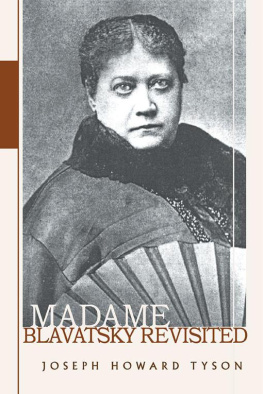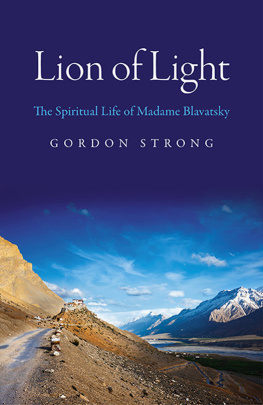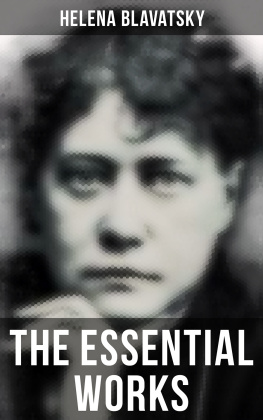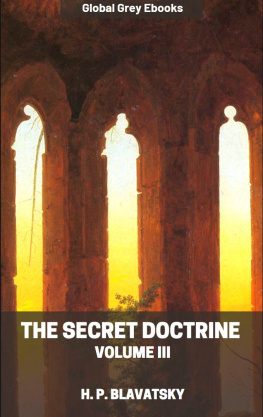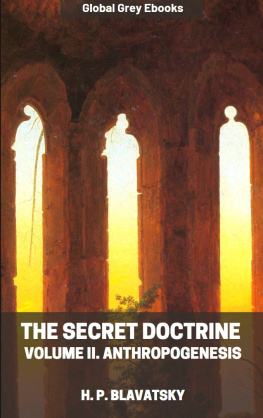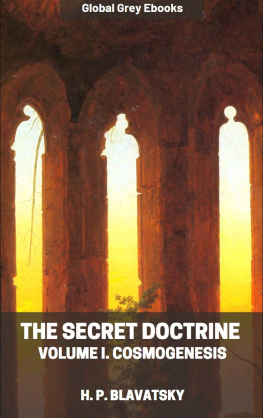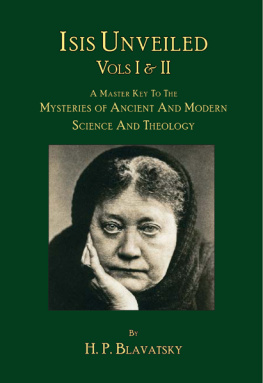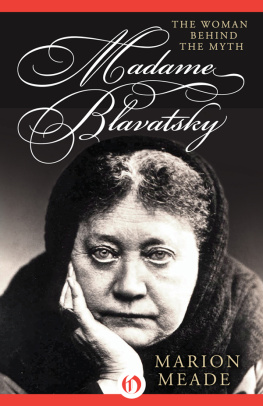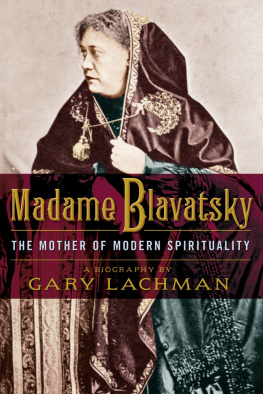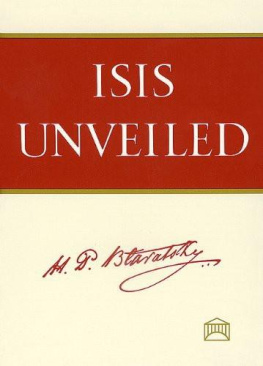Madame Blavatsky
Revisited
Joseph Howard Tyson
iUniverse, Inc.
New York Lincoln Shanghai
Madame Blavatsky Revisited
Copyright 2006, 2007 by Joseph Howard Tyson
All rights reserved. No part of this book may be used or reproduced by any
means, graphic, electronic, or mechanical, including photocopying, recording,
taping or by any information storage retrieval system without the written
permission of the publisher except in the case of brief quotations embodied in
critical articles and reviews.
iUniverse
2021 Pine Lake Road, Suite 100
Lincoln, NE 68512
www.iuniverse.com
1-800-Authors (1-800-288-4677)
The views expressed in this work are solely those of the author and do not necessarily
reflect the views of the publisher, and the publisher hereby disclaims any responsibility
for them.
ISBN-13: 978-0-595-41449-9 (pbk)
ISBN-13: 978-0-595-85799-9 (ebk)
ISBN-10: 0-595-41449-4 (pbk) I
SBN-10: 0-595-85799-X (ebk)
Contents
There is no religion higher than truth.
Motto of The Theosophical Society
Books are intellectual journeys. Authors usually compose prefaces last because they dont know the true nature of their work until completion. That was certainly the case with this one. My original intention of writing a flippant, three-page treatment of Helena Petrovna Blavatskys stay in Philadelphia went badly awry.
In our household we take family members out to dinner on their birthdays, and let them pick the restaurant. Three years ago my son Adam selected The White Dog Caf, an establishment with interesting atmosphere and good food at 3420 Sansom St. in West Philadelphia. We wondered how the place got its name. Our waitress explained that Madame Blavatsky had lived there for a few months in 1875. H.P.B. cured a gangrenous leg by letting a white dog lay on it.
Though an infamous collector of little known facts about Philadelphia, I had never heard that one. Madame Blavatsky first came to my attention while reading one of T.S. Eliots opaque poems in college. About two dozen footnotes were required to decode the meaning of these verses. One explained that H.P.B. was a shady 19 th Century spiritualist. H. L. Mencken, my favorite American essayist, wrote unkind words about Madame in Hooey from the Orient, which further buttressed my negative impression. He likened her to Christian Science doyenne Mary Baker Eddy, but considered Helena Blavatsky
a far rougher person She smoked incessantly in a day when it was simply not done by ladies, she swore like a second mate, and there is sound reason for believing that she once committed bigamy. (This) salty and amusing old harridan relied confidently on the illimitable credulity of her followers and was not disappointed
Presumably, literary idols of such grandiosity did not err.
Two years ago I had just finished a chapter for another book which catalogued 19 th Century sojourners to Philadelphia such as Edgar Allan Poe, Fanny Kemble, and Mark Twain. Some irreverent witticisms directed at a comic character like Madame Blavatsky might spice up that piece. Then the unexpected happened. By a process of cell-division that short article multiplied to ten pages, then twenty, then sixty, with no end in sight. While doing research my estimate of Helena Blavatsky changed. Her humor, intelligence, and good faith converted me from skeptic to admirer. I hope you will also behold H.P.B. with willing suspension of disbelief, rather than unwarranted contempt. One can joke about Madame Blavatsky, but her life work and writings merit serious attention.
The biographer has only to hold up a clear lens to H.P.B. to get a titillating story. This book virtually wrote itself, replete with shock or laugh on almost every page. Triteness was avoided by simply sticking to the subject: Helena Petro-vna Blavatsky. Fresh insights naturally flowed from her. Few writers had a lighter touch with weighty concepts. As Henry Olcott expressed it:
Her writing was always full of thought-suggestion, brilliant and virile in style, while her keen sense of humor often seasoned her most ponderous essays with mirth-provoking ideas.
Lifes funniness was one of its chief saving graces. H.P.B. never hesitated to brush aside tears to have a good laugh.
Biographers of Helena Blavatsky face challenges. Isis Unveiled and The Secret Doctrine promulgate arcane ideas. Her thought processes defy ordinary logic. Common sense never seems to apply. According to H.P.B.s logic, synchronicity (meaningful coincidence) accounted for experience much better than Aristotles simplistic principle of cause-and-effect. To complicate matters further, she was a moving target whose ideas changed over time.
H.P.B. fancied herself a psychologist, mystic, and philosopher. By psychology she meant Science of the Soul. Unlike naturalistic psychologists such as Freud, Pavlov, and Adler, Madame Blavatsky actually believed in the souls existence.
Accounts of living legend H.P.B.s early life wantonly intermingled fiction with fact. Although she devoted herself to truth as founder of The Theosophical Society, Madame B. covered up past misdemeanors, considering them confidential, as well as unedifying. Like all of us, she wanted to move on without dwelling on ancient history. Of course, this lack of forthrightness about youthful indiscretions damaged her credibility in the eyes of hostile critics.
H.P.B. was an enigma. They didnt call her The Sphinx for nothing. Hackneyed pop psychology categories just dont apply to such an original. Parts of Madame Blavatskys saga read like a Buddhist salvation tale. Except for the first two chapters, which deal with her errant youth, this book chronicles the reformed Blavatsky from 1875 to 1891.
Henry Olcott regretted that his natural self sometimes broke through after his conversion to Theosophy. We see the same trend with Madame, who still spouted profanity and smoked like a chimney in spite of being an adept. To some extent she was beyond good and evil.
Helena P. Blavatskys mission to bring Eastern wisdom to western nations demanded sexual continence, abstention from alcohol, exhausting journeys, and hard work. To my mind the most fascinating aspect of her career was the quan-tam leap she made from sance-room spirit-rapping to Theosophy. Could such a dramatic transformation be wrought without Higher Powers?
Madame Blavatsky often paid lip-service to Christian piety, saying that she never wanted to undermine the faith of sincere believers. In correspondence to devout Russian relatives such as Aunt Nadya de Fadeyev and sister Vera Zheli-hovsky, she generally exercised restraint, and professed respect for their religious beliefs. Yet as a pundit, H.P.B. simply could not resist alarming readers with heretical remarks. Her jarring frankness often gave fresh perspective, but ultimately made her a lightning rod for righteous Christian indignation.
Madame Blavatsky could have paraphrased W. C. Fields famous line by saying: Im free of prejudice. I hate all dogmatic religions equally. Her critiques of orthodoxy still fan the flames of controversy. At a recent writers workshop I heard audible sighs when reading an account of H.P.Bs theory that Jesus studied far eastern religions. A red-faced man abruptly left in a huff, muttering imprecations. That angry reaction surprised me. Therefore, let me issue disclaimers now. Theologically-incorrect material will follow. Helena Blavatskys opinions do not necessarily reflect the authors views! Some of her jibes against organized religion may be too harsh. On the other hand, her writings reinforce beliefs in higher religion, the spiritual world, an afterlife, and the Holy Spirit.
Skepticism steers reflective people away from errors danger zone, but ultimately gets them no place. It prevents mistakes without leading anywhere. Militant unbelief fences cynics into a vacuum. Deprived of spiritual oxygen, they languish at the dead ends of Voltaire, Karl Marx, Bertrand Russell, and Jean Paul Sartre, unable to inch forward.. As Master K. H. wrote to A. P. Sinnett in February, 1882: doubt unnerves and pushes back ones progress. Temporarily disabling suspicion allows reality to manifest. Hence, those despairing souls desirous of truth must adopt an attitude of humility, then take Kierkegaards leap of faith.
Next page
